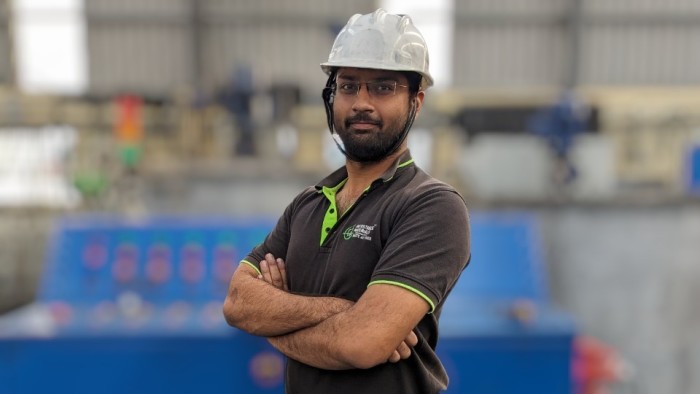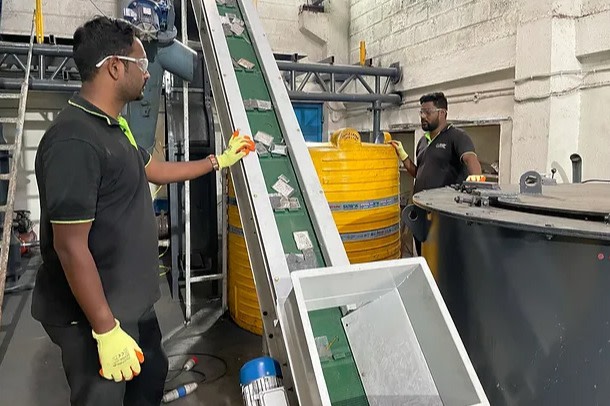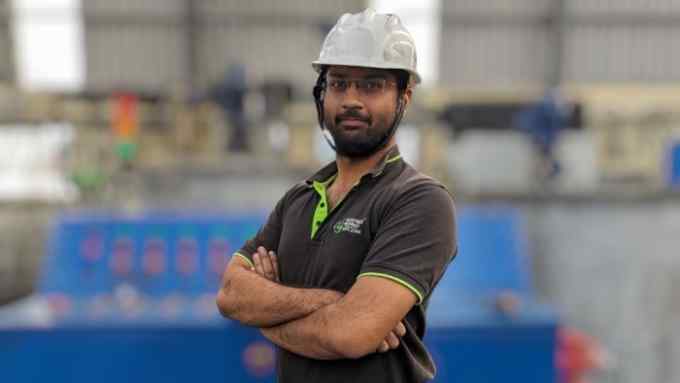Indian start-up joins race to mine batteries for raw materials

Roula Khalaf, Editor of the FT, selects her favourite stories in this weekly newsletter.
Had Shubham Vishvakarma been less clumsy in the chemistry lab, he might never have come up with the idea that he hopes will revolutionise battery recycling in India.
As a materials engineering student at the prestigious Indian Institute of Technology Roorkee, Vishvakarma — now co-founder of battery recycling start-up Metastable Materials — was tasked by a professor with improving an existing recycling process for lithium-ion cells.
Recycling these batteries, which run the world’s smartphones and electric vehicles, is one of the best ways to obtain the rare metals needed to make new batteries and, in this, China is way ahead of the pack. Its biggest battery recycling plant has the capacity to process 120,000 tonnes a year. India, with a small but growing market in electric vehicles, needs to catch up.
Vishvakarma recalls that the recycling process his professor showed him “was very chemical intensive”. But the professor’s lab was poorly stocked with chemistry supplies. “[Of] the few he had, I spilled some — and he barred me from the chemical shelf . . . as a result, I ended up inventing something that does not require any chemicals.”
Vishvakarma’s approach — like that of other inventors — was to rethink the way we see recycling. Instead of regarding it as a way to get rid of waste materials, he argues, we need to understand recycling as a way to obtain the commodities we need.

Recycling “is essentially an industry of waste management”, Vishvakarma says. “The goal tends to be to get rid of it, out of mind and out of sight.”
Yet some academics have argued “for the last 20 years that recycling should be more like an industry of mining than waste management . . . Treat the batteries like you dug them out of the ground. And if you had dug them out of the ground, how would you have extracted these metals out of it?”
Recycling as mining is the idea that now underpins Bengaluru-based Metastable’s technology, which will now be applied in a commercial factory with a 5-tonne daily recycling capacity — the smallest scale that mining techniques will allow, according to Vishvakarma. Although only a pilot, and a fraction of the size of China’s behemoth factories, this will be one of the biggest battery recycling facilities in India.
Metastable is still in its infancy — it is three years old — and was last officially valued at less than $2mn, although Vishvakarma says it now tops that figure. But it already has seasoned backers: venture capital firms Peak XV (formerly Sequoia Capital India & South-East Asia), and Speciale Invest, which focuses on science- and engineering-based innovation, have both put in money.
Also investing are two of the founders of Log 9 Materials, a Bengaluru-based energy storage company, which supplies batteries to India’s nascent electric vehicle market. Vishvakarma says he has not yet approached India’s government for funding — instead following a traditional start-up playbook.
India currently has to import metals such as cobalt, nickel and lithium, which are used for making batteries. So, for Log9, recycling batteries is essential for strengthening its supply chain.
“Given that India has not realised any local supply of lithium so far, it becomes imperative for us to secure a supply chain,” says Akshay Singhal, Log9 Materials’ founder and chief executive. “The batteries which are coming over here can be recycled and be an artificial source.”
Vishvakarma declines to describe the company’s process for shredding battery casings, which he says is not public. But the metal extraction is based on mining techniques, he explains, and uses heat rather than chemicals.
Metastable’s factory will use an electrically heated furnace, which can run on solar power grids — a source of renewable energy that India’s government is keen to develop. Once the metals have been extracted and refined to an industry-standard purity, they can be sold and traded just as they were after they were first mined.
Even so, Metastable faces challenges. Chief among them is the “reverse logistics” of sourcing used batteries, upon which Metastable’s success will ultimately depend. Vishvakarma describes this as the “Achilles heel of the whole recycling industry”.
In future, he hopes carmakers and energy storage companies will “trust [Metastable] for their end-of-life needs”. In the short term, though, Metastable will have to buy used batteries from a scrap market that collects electronics from the New Delhi region. Markets like these are supplied by India’s untold number of waste pickers, whose back-breaking and hazardous work for low pay underpins the country’s recycling economy.
But for Metastable and its investors, the recycling opportunity extends beyond India. “We’ll be part of the global supply chain — the copper, cobalt, nickel, even lithium, these are well-understood, well-commoditised products,” Vishvakarma says, arguing that there is really no such thing as an Indian market for battery recycling. As he points out: “The atoms do not care about political borders.”

Comments